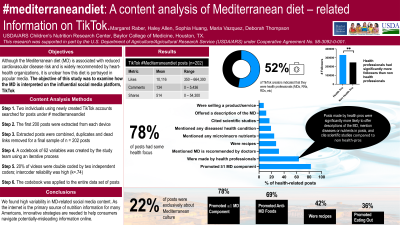Back

Objectives: The Mediterranean diet (MD) is associated with reduced cardiovascular disease risk and is widely recommended by heart-health organizations. A consistent definition of MD in the literature is lacking; thus, misinformation and consumer confusion about MD is likely. To examine how the MD is interpreted in popular discourse, we conducted a social media content analysis of MD-related video posts.
Methods: This is one of the first nutrition studies to apply content analysis techniques to TikTok, a social media app with over a billion active global users offering continuous streams of curated short-form videos. In August 2021, two independent coders downloaded the first-appearing 200 TikTok videos under the hashtag #mediterraneandiet. This approach resulted in a pre-varied sample that mirrored the natural experience of a new TikTok user. Each video was coded for 62 variables across four main categories: account details of posters, engagement statistics, video characteristics, and video content specific to the MD.
Results: Intercoder reliability across two coders was high (k=.84). Preliminary results suggest two main interpretations of the MD on TikTok. One set of posts presents the MD as a heart-healthy eating pattern, dominated by posters claiming medical or nutrition credentials. The other set of posts presents the MD as cuisines from countries surrounding the Mediterranean Sea. Clear examples emerged of individuals conflating these two concepts, with dieters actively promoting the MD for health, yet promoting cultural foods that are not typically considered part of the MD dietary pattern (i.e., lamb kebab and pita bread).
Conclusions: Although promoting the MD dietary pattern may benefit those at risk of cardiovascular disease, there remains consumer confusion on social media about what the MD entails. As the internet is the primary source of nutrition information for many Americans, innovative strategies are needed to help consumers navigate potentially-misleading online content.
Funding Sources: This research was supported in part by the U.S. Department of Agriculture/Agricultural Research Service (USDA/ARS) under Cooperative Agreement No. 58-3092-0-001.
Dietary Patterns
(PO08-42-22) #mediterraneandiet: A Content Analysis of Mediterranean Diet – Related Information on TikTok


Margaret Raber, MPH, DrPH
– Assistant Professor, Baylor College of Medicine, Houston, Texas, United States- HA
Haley Allen
– Rice University - SH
Sophia Huang
– Baylor College of Medicine - DT
Deborah Thompson
– Baylor College of Medicine
Presenting Author(s)
Co-Author(s)
Disclosure(s):
Margaret Raber, MPH, DrPH: No relevant financial relationship(s) with ineligible companies to disclose.
Objectives: The Mediterranean diet (MD) is associated with reduced cardiovascular disease risk and is widely recommended by heart-health organizations. A consistent definition of MD in the literature is lacking; thus, misinformation and consumer confusion about MD is likely. To examine how the MD is interpreted in popular discourse, we conducted a social media content analysis of MD-related video posts.
Methods: This is one of the first nutrition studies to apply content analysis techniques to TikTok, a social media app with over a billion active global users offering continuous streams of curated short-form videos. In August 2021, two independent coders downloaded the first-appearing 200 TikTok videos under the hashtag #mediterraneandiet. This approach resulted in a pre-varied sample that mirrored the natural experience of a new TikTok user. Each video was coded for 62 variables across four main categories: account details of posters, engagement statistics, video characteristics, and video content specific to the MD.
Results: Intercoder reliability across two coders was high (k=.84). Preliminary results suggest two main interpretations of the MD on TikTok. One set of posts presents the MD as a heart-healthy eating pattern, dominated by posters claiming medical or nutrition credentials. The other set of posts presents the MD as cuisines from countries surrounding the Mediterranean Sea. Clear examples emerged of individuals conflating these two concepts, with dieters actively promoting the MD for health, yet promoting cultural foods that are not typically considered part of the MD dietary pattern (i.e., lamb kebab and pita bread).
Conclusions: Although promoting the MD dietary pattern may benefit those at risk of cardiovascular disease, there remains consumer confusion on social media about what the MD entails. As the internet is the primary source of nutrition information for many Americans, innovative strategies are needed to help consumers navigate potentially-misleading online content.
Funding Sources: This research was supported in part by the U.S. Department of Agriculture/Agricultural Research Service (USDA/ARS) under Cooperative Agreement No. 58-3092-0-001.

.png)
